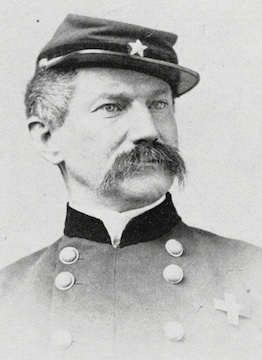Did Thomas Neill lose his nerve at Spotsy?

The death of Federal Maj. Gen. John Sedgwick on May 9 may have saved the career of Brig. Gen. Thomas H. Neill.
The 38-year-old Neill, “who had been an excelling brigade commander,” had risen to command of the Second Division in Sedgwick’s VI Corps after its former commander, George Getty, took a bullet to the shoulder in the Wilderness on May 7. But less than 36 hours later, with “tension too great for him to bear,” Neill apparently “entirely lost his nerve.”
Or so reports one of Sedgwick’s staff officers, Charles A. Whittier.
According to Whittier, on the morning of May 9, Neill began to withdraw his division from the front line. Sedgwick intervened, riding over to reverse the order in person and then “for a long time . . . supervised the digging of rifle pits and entrenchments.”[1] In this scenario, we can only assume Sedgwick spent time talking with Neill, perhaps trying to steady his subordinate’s nerves.
Unfortunately, though, we don’t have a clear picture of what actually happened that morning because we have only Whittier’s thin account of the event. While Whittier has generally proven to be a reliable witness, he’s also somewhat of a malcontent although devoted to and fawning toward Sedgwick himself. Corroboration of his May 9 account remains elusive.
So how do we parse this out?
We do know Samuel Crawford’s V Corps division had become intermingled with Sedgwick’s corps during the late-day assaults on May 8. Crawford had finally received orders from his commander, Maj. Gen. Gouverneur K. Warren, to withdraw from his position on the morning of May 9 and shift rightward to rejoin the rest of his corps. Perhaps Neill’s men somehow got entangled in that shift. Or perhaps Whittier was confused entirely about who was moving where and when, mistakenly blaming Neill for Crawford’s move.
We also know that on the evening of May 8, one of Neill’s subordinates, Brig. Gen. Henry L. Eustis, was drunk and temporarily relieved of command.[2] Positioned on the far-left flank of the army, perhaps Eustis—whose brigade took a beating from a Confederate counterattack that evening—had caused trouble of some kind for Neill for which Neill got the blame.
We know Neill himself, that evening, appeared in fighting trim. “As we sat there Neill’s brigade passed to the left, marching by a flank,” wrote Theodore Lyman of George Gordon Meade’s staff. “‘Bean Neill’ himself rode by the men, attired in a sort of civilian suit of grey brown;—faith he is never dressed like anybody else!”[3] Beyond his clothes, nothing else seemed amiss.
In any event, if Neill had lost his nerve and merited disciplinary action of some kind, Sedgwick did not live long enough to address the problem. A short time after the VI Corps commander’s visit to Neill, a sharpshooter killed Sedgwick as he inspected another portion of his line. Major General Horatio Wright ascended to corps command. Neill remained as division commander until Getty’s return later that summer. It is perhaps worth noting that Neill transferred to staff positions, rather than a field command, first with Maj. Gen. Phil Sheridan (not someone who suffered fools) and then with the Army of the James. Neill served in various administrative posts through the end of the war.
Whatever transpired that May morning between Neill and Sedgwick—if anything—it went with Sedgwick to the grave.
————
[1] Charles Whittier, memoir, typescript, Ms. “20th” Cab. 6.3, Boston Public Library, FSNMP BV 266.
[2] Oliver Edwards, Reminiscences, 138, FSNMP BV 119-11.
[3] 3 Theodore Lyman, Meade’s Army: The Private Notebooks of Lt. Col. Theodore Lyman, David Lowe, ed. (Kent, OH: Kent State, 2007), 145. Lyman spelled Neill’s name with one “l,” corrected here for consistency.
I think you got it exactly right … BG Neill did have a breakdown on 9 May … Whittier may have been an occasional pain-in-the-neck — as staff officers often are — but there’s no reason to doubt the veracity of his account which he penned the next day … finally, the fact that Neill did not return to his brigade that summer and served as staff officer for the remainder of the war is telling as well … really nice work, thanks.
You Neilled it.
In 1973 I spent 90 days @ Fort Eustis, Virginia. I wonder if it was named after BG Henry Eustis mentioned in the article. I don’t recall learning the history of the Army base(near Williamsburg).